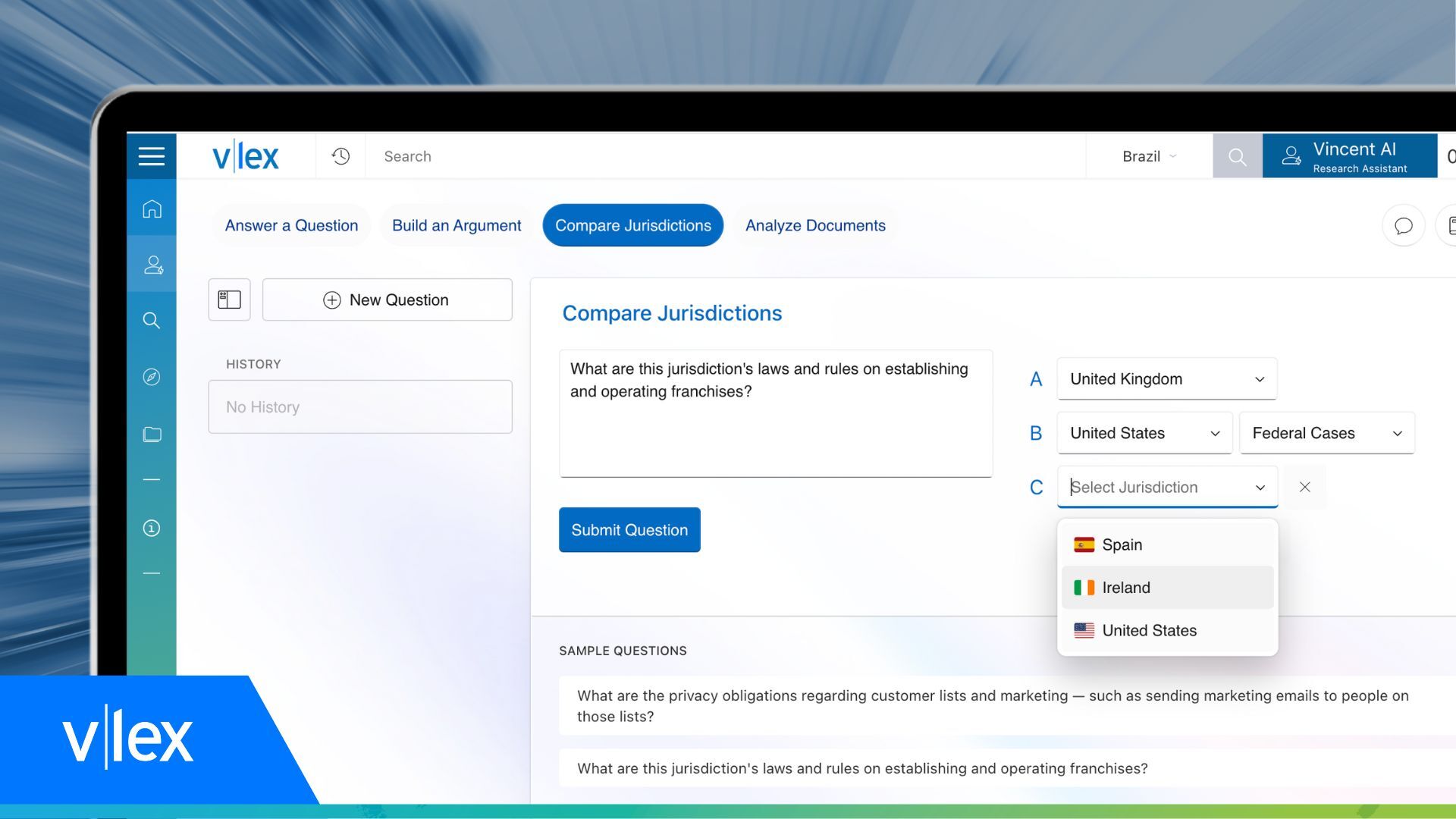Building business as a new attorney (podcast with transcript)
Podcast transcript:
Stephanie Ward: Associates, are you swamped doing thankless tasks on a big piece of work, and think you have zero opportunities for business development?
Clinton Gary: Don’t forget about you’re in the trenches with people who probably be GCs of that organization in the next several years.
Stephanie Ward: I’m Stephanie Francis Ward, and when we return, my guests will tell you about young lawyers cultivating connections into future clients.
Advertiser: This ABA Journal Podcast is brought to you by Westlaw Next. Folder sharing in Westlaw Next enables you to tap into previous research across organizational boundaries like never before, saving you time from reinventing the wheel. Learn more at westlawnext.com.
Stephanie Francis Ward: I’m here with law firm marketing directors Clinton Gary and Sheri Meyers. Also joining me is Larry Kohn, an executive coach; and Matt Zumstein, an associate with Ropers, Majeski, Kohn & Bentley.
If you want to stay at your firm or in private practice, is anybody safe if their goal is to be a service partner as opposed to a business getter? Larry, why don’t you take that first?
Larry Kohn: Yeah, I think it depends upon what it is that you want to do. And if you really love being a service partner and that activity accommodates your lifestyle and maybe you really don’t see yourself as a business developer you could certainly be a service partner and make a very good living and have a wonderful life.
Matthew Zumstein: Yeah, this is Matthew. I would echo that, at least at Ropers you know we’ve got partners who bring in the files and partners who work on the files and there are a number of attorneys who choose to simply work on the files and there’s really no problem with that here at Ropers.
Stephanie Francis Ward: Does anyone think it’s risky in this day and age with the practice of law and private practice to not be bringing in business or attempting to bring in business?
Sheri Meyers: You know, it sort of depends, I guess, on the goals that they come to the firm with. But generally at least at my firm, there is an expectation of moving along on the partnership track which includes also developing new business. So you know, I think that would be a conversation that would need to take place at the onset of someone coming to at least our firm.
Clinton Gary: This is Clinton. At our firm we take a balanced approach, and that is over time as they move from associate to partner there should be a shift. But even after the shift there should be a balanced approach, maybe not a 50/50 but if you go off that mark, we like people to stay in the middle there. We have to have quality attorneys as well as people that are doing origination. And we try to do that within our firm, that’s the culture we have.
Stephanie Francis Ward: And do you have a sense of whether partners with business are perhaps more happy and satisfied because–I mean, to put things simply–they control what they eat?
Larry Kohn: I think personal satisfaction has less to do with whether or not you’re a business getter as to whether or not you enjoy the practice of law or enjoy what you’re doing. I think that it is very, very satisfying to bring in business and the vast majority of the lawyers that we work with go through this process of seeing themselves as a lawyer first and really a professional that only deals with being a lawyer. But over years, they really come to the realization that the best lifestyle for them is being a rainmaker. So we see that transpire over a long period of time, and almost everybody that we talk to shifts to that rainmaker model in the latter years of their career.
Stephanie Francis Ward: Okay, and let’s say that you are an associate, you want to stay in private practice, and you’re thinking about bringing in business. You want to start trying. How do you tell if your firm is really going to be supportive of you on that–or a situation that I think we’ve all heard of, where the firm says they love for associates to get business, but they don’t really support them when they do?
Clinton Gary: We do support our associates but we set the expectation that you don’t want to get too far out of the box in developing new business until you have confirmed that you have mastered the skills of being a great lawyer. And that’s because we value high quality work for our clients.
Stephanie Francis Ward: How can you confirm that? What do you need to know as a young lawyer?
Clinton Gary: Because we have a competency model by which we want to make sure that a person doesn’t jump from level one all the way to level five, and swing to the business development side before they have mastered the first four levels. So that way you’re really building off a foundation of lawyering skills which should then enhance you to then make the jump from associate to partner, if done correctly. So we try and make it very methodical.
Stephanie Francis Ward: Okay.
Larry Kohn: This is Larry. Let me just comment on this. One of the best ways to find out if the firm is supportive is will they compensate you for bringing in business. And in that situation, will they give you the time necessary to go to events and to do things. So often, it’s revealed itself specifically in dollars and in hours that they allocate to marketing efforts.
Stephanie Francis Ward: What can a firm do to support associates in their efforts for this development, besides counting it towards billable hours and the compensation of course?
Matthew Zumstein: Well, I think Larry–this is Matthew again–I think Larry hit it on the head, and that is, do they compensate you for your time, such as you know I get compensated for my expenses that I incur while I’m going out and doing my business development, and my time goes down as promotional time. And so at the end of the year, they like to see a certain number of promotional hours and if your working hours or your billable hours are, for example, maybe a little bit lower that week or that month, will your promotional hours show that you’re actually putting in more than 40 hours a week, 60 to 80 hours a week if you counted all the time put in. Then they look at that and they go, “Well, he’s still working” and that’s taken into consideration.
Clinton Gary: I would echo that, because in our firm, going back to that balanced approach, we do have the three buckets of client billable time, non-billable time and pro bono. And as we know this is a measurement, law firms are measurement organizations and those are barometers to be able to see where the associate is leaning towards and then provide coaching if they’re a little bit off. But I love what Larry said, and that is compensation. We do have that, that if associates are originating work when they get to the higher levels of their competency, they do get a commission for that work. Once again it has to be tempered with–it can’t be at the sacrifice of being a great lawyer delivering quality service.
Stephanie Francis Ward: So, it sounds like if you are a younger lawyer and your dream is to be a rainmaker you need to get to a firm that compensates you with billables with your marketing activities, right?
Clinton Gary: That’s one measure. They have to be supportive. Many firms will not compensate associates; to me it seems odd that they don’t, because business is business. But if they don’t compensate you, at least are they being supportive? Because the fact is that you begin your marketing efforts early in your career. If you really want to get good at this, the earlier you can start the better.
And if you’re at a firm that frowns on it and only wants you doing billable hours, then you should be a different place. If you really want to be a rainmaker, it’s very much in your best interest to start early. And if a firm doesn’t support it with dollars and with hours and with a culture that makes you feel welcome in your doing it, you should look elsewhere.
Stephanie Francis Ward: When you say early, do you mean like a first-year associate?
Clinton Gary: I mean first-day associate.
Stephanie Francis Ward: Okay. And so what are some things–okay first day, all right whatever. For that early stuff, what are some things you could do early that first year that you think would be good activities, and perhaps successful activities?
Larry Kohn: This is Larry. The first thing that you want to do is make sure that you stay in touch with all the people that you went to law school with, because some of those people are going to be in positions of authority. And there’s this unbelievable odd rule that the people that you thought were the nerdiest and that you didn’t like the most, those are the ones that end up in power fastest.
So, you have to be very careful not to burn bridges and to be really good at staying in touch with the people that you know. And if you can learn to stay in touch with the people that you know over time, many of those will be in positions to introduce you to other people or to be able to give you business. And that’s the very, very first thing that I would suggest that young lawyers get good at. There’s a long list here. I’ll let my colleagues on the panel discuss others.
Matthew Zumstein: This is Matthew and I would echo that, because I remember from first year torts that my law professor Larry Levine at University Pacific McGeorge School of Law said a reputation is hard to gain and easy to lose. And so from day one in law school–I mean this could also be sent to law students who are starting school this August–stay connected with your colleagues, maintain good relationships with your fellow students. Because as Larry mentioned, those will be the people that you will rely upon going on in the future to, you will meet them in cases later on.
You can refer business to them, they can refer business to you. And it’s also a natural networking because if they are part of the alumni association, there are alumni association events that you can run into them, make sure you’re a part of, and ask them if they’re going to go to. And then that’s another way to network.
Clinton Gary: I would add one more on that one, going back that most associates are starting working with institutional clients–larger, let’s call them larger, institutional clients–and you can’t emphasize enough of when providing great client service form those relationships with those one, two, three, four layers down within that organization. And that is also a skill-building action that you do that you could also take externally when you go to new organizations. But don’t forget about you’re in the trenches with great people who will probably be the GC of that organization in several years. So that’s a great place to also work.
Stephanie Francis Ward: Let’s talk a bit about business development and keeping an eye on having perhaps portable business, if you want to switch firms down the line as many associates do. What are some ideas about having business and be bringing a business you can take with you if you decide to switch firms?
Clinton Gary: How successful can you be if you have one foot in and one foot out? There will always be business that follows you if you are really good at what you do. And if you deliver quality service, and you form those relationships, that is what secures the relationship to then travel with you if you decide to leave, more so than trying to orchestrate it in a way that you’re prepared to jump whenever you need.
Larry Kohn: Let me comment on this, because I’ve been doing this for 30 years and I’ve talked to an awful lot of lawyers who have the very strong conviction that they’re building their own little empire, and that they don’t want to bring in other people because they are afraid of losing the relationships, and it really hurts them in their ability to cross-sell. But the solution to this problem is to aggressively institutionalize the business, cross-sell as much as you can, work with as many different lawyers in the firm to install them so that your client is served.
But do a real good job of maintaining the social connection with your client. And if you orchestrate good legal work but maintain a social relationship, in the event that you do decide to leave or if the firm falls apart or whatever happens, there’s a very good possibility that if you’ve maintained a good social connection, that you’ll be able to maintain that relationship. So cross-sell, install others in the relationship that maintain the social connection. That’s the way you do it.
Stephanie Francis Ward: Now, someone mentioned earlier marketing attempts are a bit off among associates. What are some things that everyone has seen where associates tried to do some marketing and it really doesn’t work out well? Because, I mean, I do think it takes a bit to figure out how to do it well.
Larry Kohn: I’m happy to talk about that. The biggest mistake that young lawyers make and the biggest mistake that more senior lawyers make is they waste their time interacting with the wrong people. If you ever hear a lawyer say that they went to an event and they don’t like working the room, that’s because the room that they’re working isn’t filled with good targets. The minute you put a lawyer into a room filled with good targets, they enjoy the experience.
So the whole thing of marketing is using your time wisely, and it all revolves around your ability to identify who are the people that you want to spend your time with. So what doesn’t work is going to a chamber of commerce meeting if your targets are in-house counsel, and there’s no in-house counsel at a chamber of commerce event. And as obvious as that seems, it is astounding how much time is wasted by lawyers who go to events that are poorly targeted.
Clinton Gary: I would agree with Larry on that one. We have an expression here at the firm where it’s: Be intentional, be active and be authentic. And the first one we use would be intentional. It can’t be random acts of marketing. It needs to be: Where am I going where there are the type of people that I want to meet? And that’s the beginning. And then be active, do it frequently. Make a commitment. And then be authentic, be yourself. If you are more introverted, fine, there’s a way of working that into your character and building conversations with them. And so what I find is associates that lose confidence because they’re not playing to their strengths and they’re not playing in a room that plays to their strengths.
Stephanie Francis Ward: How do you find out what your strengths are, or do you already know? Is it an issue of being honest with yourself? Larry, what are your thoughts about finding what works for you as a young lawyer for business development?
Larry Kohn: Well, the most important thing for a young lawyer is to identify all of the different services that are available from the firm, because most young lawyers feel too insecure to offer their own services, because they don’t necessarily see themselves as the qualified lawyer that they would feel comfortable promoting. So young lawyers need to really study the websites of their firms, they need to interview the partners and learn what they do. And then very specifically, they need to learn the offers that partners make to people as a way to introduce their services.
So, if you are at a firm that has an employment lawyer, does that employment lawyer offer some kind of a free sexual-harassment-avoidance seminar or a free analysis of their employee manual? And so every partner needs to be able to teach the associate what they might be able to say to somebody, in the event that they met somebody that might have a need in a room. A business owner who has a bunch of employees, well, “You need our employment partner, because she or he does this really great thing.” And it’s product knowledge. In any industry, your ability to communicate the benefits comes as a result of your really deeply understanding the product.
And the other point that I wanted to make from a comment earlier, if you’re really looking for your strengths the interesting thing about lawyers is that they all have the strengths to do the most important aspect of marketing. And that is–and Matt referred to it–be valuable. Be a person of value. Don’t think of marketing your practice as bragging about what you do in your elevator speech that says how great you are because that just–
Stephanie Francis Ward: People don’t take you seriously if you say how great you are, right?
Larry Kohn: Well, some people might even like it. There are sports lawyers who deal with sports figures. I’ve seen lawyers put their suit coat over their shoulders like it was a cape and stroll around and some of the people in the room loved that. I mean–
Stephanie Francis Ward: And there are some lawyers who actually wear capes, but that’s another podcast.
Larry Kohn: That’s right. So, you’ve got to really play to the need of the people that you’re talking to. But the real issue is: How can you be a person of value? And don’t think of this as pitching yourself, just be valuable and people will see you as genuine and authentic, and that gives you the ability to get them excited and want them to spend time with you.
Stephanie Francis Ward: All right. And that’s everything we have. So I think you all so much for your time.
Advertiser: This ABA Journal Podcast is brought to you by Westlaw Next powered by WestSearch, the world’s most advanced legal search engine delivering the best results in seconds. Learn more at westlawnext.com.
Updated at 12:33 p.m. to add transcript.
Business development starts from the ground up, guests tell ABA Podcast moderator Stephanie Francis Ward, and associates have opportunities to make good first impressions today with the decision makers of tomorrow.
In This Podcast:

Clinton Gary
Clinton Gary is the marketing director for Arnall Golden Gregory in Atlanta. His work involves increasing brand awareness and enhancing collaborative business development work.

Larry Kohn
Larry Kohn, an executive coach, is president of Los Angeles-based Kohn Communications. He’s co-author of Selling In Your Comfort Zone, which was published by the American Bar Association. Kohn Communications’ blog about business development for lawyers can be found at http://www.kohncommunications.com

Sheri Meyers
Sheri Meyers is the director of marketing with Riddell Williams, a mid-sized Seattle law firm. She’s been involved in legal marketing for more than 25 years.

Matthew D. Zumstein
Matthew D. Zumstein is an associate with the Redwood City, Calif., office of Ropers, Majeski, Kohn & Bentley. A former prosecutor, he now represents developers and general contractors.



